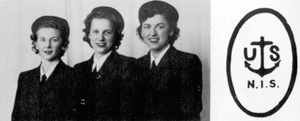REAL-LIFE ROSIE THE RIVETER

The tragedy at Pearl Harbor impacted America far beyond the strike of Japanese bombs. Fathers, brothers, husbands, and lovers were being sent overseas leaving their country, and women, behind. Still blissfully newlywed in 1941, *Mrs Andrews could never have guessed the hardship the following years would bring. Luckily, however, an opportunity arose that would change the way Americans saw women forever.
“When my husband heard about Pearl Harbor he said he’d be in the service in 6 months…and he was, almost to the day,” said Andrews.
After the attack on Pearl Harbor, it was safe to assume that her family life was about to radically change. By the time her husband got his draft card, she was prepared.
“Of course I was sad,” Andrews said, “But it was what he was supposed to do…we had to put that out of our minds.”
Living alone as a woman in 1941 was a daunting task. Weighted by sadness, but armed with a sense of duty, she was forced to take on responsibilities she had never experienced before. Her top priority, of course, was to find a job. Because of prior work with a local factory, Andrews received a call from Civil Service asking her to come for testing in Fort Wayne to see if she was qualified for a possible job opening with the Navy. “Someone must have been looking out for me,” she said.
Only days after her husband was shipped overseas, Andrews began working at the Hosdreg factory in Huntington, which manufactured artillery shells. Aiding in the cause, she made over $17 a week–an exceptional wage during that time. Under the official title of Naval Ordinance Inspector, she spent her days in front of a conveyer belt, randomly inspecting thousands of artillery shells. Through their work at the company, women of Hosdreg did not let their efforts go unnoticed. Numerous employees received the prestigious “E” award for outstanding production and patriotism. Surprisingly, Rosie faced no harassment due to her gender during her time at Hosdreg.
“It really didn’t matter, as long as you were qualified,” she said.
While her husband was overseas and money was tight, friends and family insisted that she stay with them. Because of this, free time was spent in the company of loved ones. Like everything else, gas was rationed during wartime, and she was one of the few of her female co-workers who owned a car. “Gasoline bothered me the most because I had to be careful where I drove.” Whenever she saved enough, her and her friends would drive to Fort Wayne to shop and eat at Azar’s.
Toward the closing of WWII, Andrews position was terminated. “It was a wartime job, I knew that.”
Her husband returned in early November, 1945 and the traditional normalcy she had once known returned along with him. Andrews, along with the other nine female inspectors, inadvertently became the model for generations of feminists to follow. These women have made giant leaps considering women had only gotten the rights to vote 20 years previously. The memories Andrews made and the strength she had shown gives an example of honor and duty all can learn from.
“It was our country, and we worked for it.”
The subject of this story has requested we keep her first name confidential.
- Consistent Donations Provide Critical Blood For Patients - February 13, 2026
- Roll In To Support & Play For “Bowl For Kids’ Sake” - February 13, 2026
- Fort Wayne Airport Celebrates Record-Breaking 2025 - February 13, 2026


